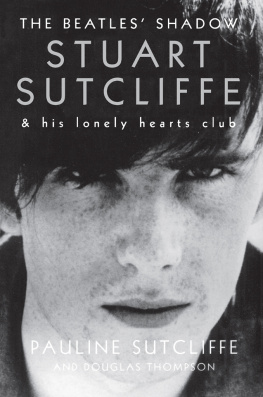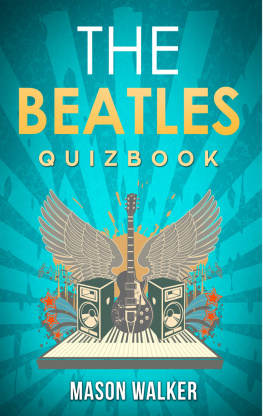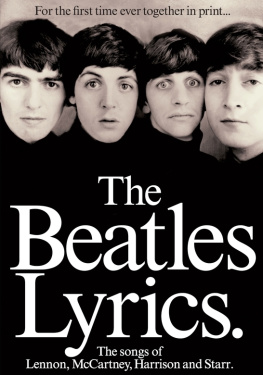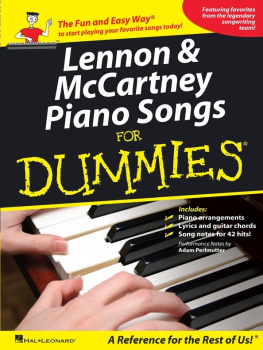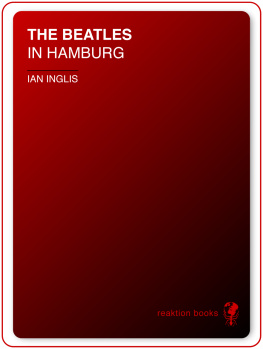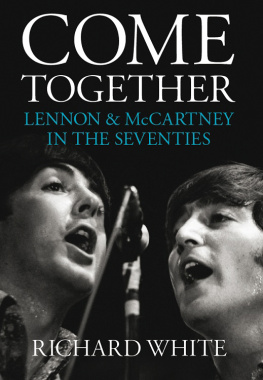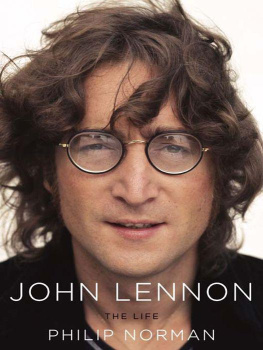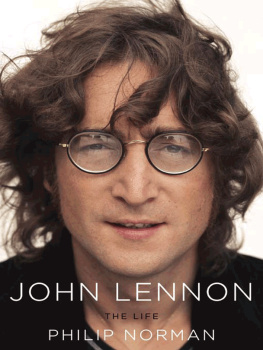
For my family
Acknowledgements
With a little help from your friends... A generous thank you to Gordon Wise for his brilliant inspiration of introducing me to Douglas Thompson who, with his sensitivity, good humour and experience, has helped me honour my brothers life and art with this book. Also, much gratitude to Ingrid Connell for her focus and skills.
John liked and wanted strong personalities, and I think what he learned from Stuart was a certain mystic quality. Stuart was different and that attracted John.
Bill Harry
We have improved a thousandfold since our arrival and Allan Williams who is here at the moment says there is no group in Liverpool to touch us.
Stuart Sutcliffe reporting from Hamburg on the success of the Beatles in a letter to his sister Pauline
They are not ever jealous for the cause, But jealous for they are jealous.
Shakespeare, Othello
List of Art Works
Unless otherwise stated, all artworks are from the Pauline Sutcliffe collection.
prologue
Magical History Tour
Life without memory is no life at all.
Luis Buuel

HAPPILY, I SHARE my birth day with Elvis Presley. I first found that out from my older brother, Stuart. He loved Elvis. Stuart wanted more than most. He loved life. He locked on to the Elvis energy, yet it was never about teenage rebellion but, rather, wanting to run at the horizon and leap as fast and as enjoyably as possible over it. Everything that increased his pulse rate and his curiosity was special. His mind was always racing, intrigued by people, music, and art, and all the shades and aspects of life and imagination that gave so much purpose, a resonance, to his own. Our parents, especially my mother, set the rules of the race for all of us. For Stuart, it was a sprint. He died on 10 April 1962, aged twenty-one. He died abroad, and such were the complex rules of returning him home for a family funeral I never saw him in death: he was locked in his coffin. The German undertakers said his hair was combed forward and he looked like one of the Beatles, which was perceptive of them. He was.
Stuart Sutcliffe was an original Beatle, John Lennons intimate friend, one of the young Liverpool boys who were there as a musical legend was being created; but also being conjured up were events, some that can only be thought of as happenstance, others severely premeditated, that brought my family and the Beatles into lifelong association. Overwhelmingly, there has been a sadness and suffering that began not all that long after my brother christened himself and his young friends the Beatles.
My family have lived with none of the benefits but all of the enmities and rivalries, and sometimes the horrors, of our founding association with the most popular musical group of all time. As it turned out, the Beatles so easily could have been Stuart Sutcliffes Lonely Hearts Club Band, for Stuart, who played in and named the group, became (like Sergeant Pepper) a ghostly, fantasy figure, just a shadow, in the greatest show business story ever. Depending on your arithmetic he was the fourth or the fifth Beatle but after he died he was lost, the forgotten Beatle. Especially to the Beatles. They circled the wagons. They were ordinary young men caught up in extraordinary and fast-changing times, and by the mid-1960s they were the most famous people in the English-speaking world already mythical to everyone but themselves, trapped as they always would be simply by being Beatles.
Of course, it is a strange world; people are particular and peculiar. I do know. I have spent my working life as a social service manager, and as a trained psychotherapist I have confronted and dealt with the elaborate problems that face so many people on a daily basis; often we have high-sounding, technical names for the myriad disorders that can trip up peoples lives and those around them.
Since the late 1960s when I was doing my training, generously being given many educational opportunities to learn from some of the very best, I have thought about the real relationship between Stuart and John Lennon. As you become older there is more sense to your world, to your past. I was a teenager when I first met John with Stuart and the glances between them registered but without meaning. I knew there was more to it but it was only later that I had the knowledge to understand. It was a jigsaw puzzle in my mind over the years and probably I did not want to publicly acknowledge the total truth of what they had together. I never saw any shame in any of it but I was reticent. I have kept to myself all I know and feel about my brother and John for many years. Secrets can be painful. Yet, recent publications have not been as shy as I was. These twenty-first century accounts have lanced the boil for me, made me feel free to tell Stuart and Johns real story for the first time. Also, I strongly believe there is a purpose now to be spelling it out for it explains so much about John Lennon and the story of the Beatles. With this book I am completing the foundation of their story, putting the last brick in place. As they say in my business, establishing closure.
I found myself analysing my own thoughts on a comfortable couch on Continental Airlines Flight 57 to America from Gatwick Airport in London. We had just climbed out of the clouds and they had switched off the seat-belt sign and announced a turbulence-free journey to Cleveland, Ohio, the home of the Rock and Roll Hall of Fame and Museum. A glass of long-oaked Chardonnay and some mineral water was presented to me as I looked out at the blue skies; life, if not altogether bump-free, does seem calmer. There was a hopeful horizon for me and I raised the glass in a silent toast. It was to Stuart, to my sister, in memory of my parents and, also, to John Lennon. I included all the others who did not survive long enough alongside that still ongoing phenomenon, the Beatles, in which my brother had such an inspirational and important role. They did not have a choice, but I did. Strangely, as a twenty-first-century Beatlemania manifested itself worldwide hits, lost tracks rediscovered, Paul McCartney planning a Beatles film I wanted the Beatles out of my life, for ever.
First, there was something I had to achieve and for a long time it had appeared impossible: I needed, metaphorically, to get my brother back, to resurrect him, and in so doing be able, after more than four decades, to lovingly, properly, say farewell to him. And that is what concerned my journey to Cleveland; it revolved around the circle of life whereby, simply, we have to confront and deal with our problems in order to put them to rest. When my brother died the Beatles were an aspiring and popular group in the clubs of Hamburg. Stuart was pursuing his fabulously promising artistic career, but as often as possible would go to watch and listen to John, George Harrison, Paul McCartney, and the then drummer Pete Best, in the often wild but always exciting clubs of that loose-minded German city Sometimes he would take up his old position onstage with them. He understood this bunch of boys who played toe-tapping music and enjoyed good times together. There was a Musketeer element about them: they were all teenagers from Liverpool, all, in their own ways, Jack-the-Lads, cheeky, quick-witted, friendly, engaging; on the flip side was the Iago factor: they had all of the individual jealousies brought on, in Stuarts day, by their fledgling success and envy of each other. In later life, I have always had to deal with the dark side.
Next page
